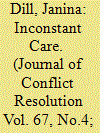|
|
|
Sort Order |
|
|
|
Items / Page
|
|
|
|
|
|
|
| Srl | Item |
| 1 |
ID:
189958


|
|
|
|
|
| Summary/Abstract |
The choice between protecting friendly soldiers or foreign civilians is a critical strategic dilemma faced in modern war. Prevailing theories suggest that casualties among both groups depress war support in Western democratic societies. Yet we know little about how ordinary citizens balance force protection and civilian casualty avoidance, and whether public opinion differs across Western democracies. Using survey experiments, we test three micro-foundations for what we call individuals’ “harm-transfer preferences:” self-interest, perception of soldiers’ consent to risk-taking, and nationalism. We find that respondents’ perception of soldiers’ consent and respondents’ nationalism explain individual-level variation in harm-transfer preferences. Moreover, Israeli citizens are significantly more likely than American or British citizens to prefer protecting friendly forces over avoiding foreign civilian casualties. This is associated with higher levels of nationalism and the perceptions that soldiers do not consent to risking their lives in Israel compared to the United States and the United Kingdom.
|
|
|
|
|
|
|
|
|
|
|
|
|
|
|
|
| 2 |
ID:
188211


|
|
|
|
|
| Summary/Abstract |
Recent scholarship has established that a majority of Americans will support the use of nuclear weapons and violate the principle of noncombatant immunity when American lives are on the line. Some scholars contend, however, that these hawkish American attitudes are an outlier and that other Western democratic publics have more fully internalized the nuclear taboo, as well as the prohibition on deliberately killing civilians. To investigate cross-national attitudes on these important norms, we conducted a survey experiment of American, British, French, and Israeli citizens. We find that American attitudes are not exceptional. Rather, Israeli respondents display the most hawkish preferences; French and American citizens are roughly equally hawkish; and the British public is consistently the least supportive of nuclear use or targeting civilians. Categorical prohibitions—against nuclear use and targeting civilians—do little to shape public opinion in these four countries. Instead, public opinion in each state follows the same consequentialist logic: a majority or near majority of respondents are willing to support using nuclear weapons when they are more effective than conventional options, but support declines when collateral civilian deaths rise. Respondents’ preferences for compatriots over foreign civilians and respondents’ retributiveness help explain individual-level variation in attitudes.
|
|
|
|
|
|
|
|
|
|
|
|
|
|
|
|
| 3 |
ID:
192023


|
|
|
|
|
| Summary/Abstract |
Thinking deeply about how a nuclear war might break out is neither easy nor enjoyable. Scholars do so, however, because we hope that contemplating the pathways by which such a cataclysm might happen today could lower the risk one will happen in the future. For that reason, we owe a special thanks to Mark S. Bell, Målfrid Braut-Hegghammer, Yogesh Joshi, Benoît Pelopidas, and Kjølv Egeland, who have joined us in this discomforting mission. Our article found that different states have similar “kettles of hawks” who favored nuclear use across different scenarios. We are pleased that the contributors to this exchange have formed “a parliament of owls” that has raised important questions, forwarded valuable insights, helped us clarify key points in our own thinking, and pointed the way toward critical new research on nuclear war.
|
|
|
|
|
|
|
|
|
|
|
|
|
|
|
|
|
|
|
|
|